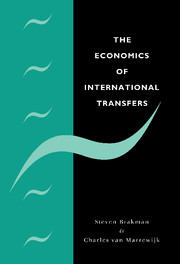Book contents
- Frontmatter
- Contents
- List of figures
- List of tables
- Preface
- 1 General overview and stylized facts
- 2 The Keynes–Ohlin controversy
- 3 Welfare effects: Samuelson's theorem
- 4 Generalizations of Samuelson's theorem
- 5 Clouds on the horizon 1: distortions
- 6 Clouds on the horizon 2: third parties
- 7 The economics of multilateral transfers
- 8 The consequences of tied aid
- 9 Imperfect competition
- 10 Dynamics, money and the balance of payments
- Mathematical appendix
- References
- Index
2 - The Keynes–Ohlin controversy
Published online by Cambridge University Press: 07 January 2010
- Frontmatter
- Contents
- List of figures
- List of tables
- Preface
- 1 General overview and stylized facts
- 2 The Keynes–Ohlin controversy
- 3 Welfare effects: Samuelson's theorem
- 4 Generalizations of Samuelson's theorem
- 5 Clouds on the horizon 1: distortions
- 6 Clouds on the horizon 2: third parties
- 7 The economics of multilateral transfers
- 8 The consequences of tied aid
- 9 Imperfect competition
- 10 Dynamics, money and the balance of payments
- Mathematical appendix
- References
- Index
Summary
Introduction
The undisputed highlight among controversies involving international transfers is the discussion in 1929 between the Englishman John Maynard Keynes and the Swedish economist Bertil Ohlin. In March of that year Keynes published an article in the Economic Journal, of which he was editor. Keynes argued that the reparations payments imposed on Germany after World War I were too high a burden on the German economy. According to Keynes the required price and cost cuts for the German export sector were virtually impossible to achieve. Bertil Ohlin responded in the same journal later the same year by claiming that only limited export price changes, or none at all, were necessary for the expansion of the German export sector.
For a long time, starting with David Hume and John Stuart Mill and continuing up to the beginning of this century, changes in price levels played the predominant role in economic analyses in bringing about the necessary adjustment of trade balances following a transfer from one country to another. This partial equilibrium analysis ignored an important equilibrating factor: the influence of income changes in the paying and receiving countries on the demand for goods. As we shall see later, the changed demand for goods due to income changes as a result of a transfer might make relative price changes entirely unnecessary under certain circumstances. Bertil Ohlin was the main catalyst for this realization, notably in his heated debate with John Maynard Keynes.
- Type
- Chapter
- Information
- The Economics of International Transfers , pp. 22 - 31Publisher: Cambridge University PressPrint publication year: 1998



